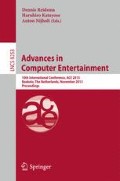Abstract
Winning or losing a game session is the final consequence of a series of decisions and actions made during the game. The analysis and understanding of events, mistakes, and fluxes of a concrete game play may be useful for different reasons: understanding problems related to gameplay, data mining of specific situations, and even understanding educational and learning aspects in serious games. We introduce a novel approach based on provenance concepts in order to model and represent a game flux. We model the game data and map it to provenance to generate a provenance graph for analysis. As an example, we also instantiated our proposed conceptual framework and graph generation in a serious game, allowing developers and designers to identify possible mistakes and failures in gameplay design by analyzing the generated provenance graph from collected gameplay data.
Access this chapter
Tax calculation will be finalised at checkout
Purchases are for personal use only
Preview
Unable to display preview. Download preview PDF.
References
Davis, J., Steury, K., Pagulayan, R.: A survey method for assessing perceptions of a game: The consumer playtest in game design. Game Studies 5 (2005)
Kohwalter, T., Clua, E., Murta, L.: Provenance in Games. In: Brazilian Symposium on Games and Digital Entertainment (SBGAMES) (2012)
Freire, J., Koop, D., Santos, E., Silva, C.T.: Provenance for Computational Tasks: A Survey. Computing in Science Engineering 10, 11–21 (2008)
Warren, C.: Game Analysis Using Resource-Infrastructure-Action Flow, http://ficial.wordpress.com/2011/10/23/game-analysis-using-resource-infrastructure-action-flow/
Consalvo, M., Dutton, N.: Game analysis: Developing a methodological toolkit for the qualitative study of games. Game Studies 6 (2006)
Andersen, E., Liu, Y.-E., Apter, E., Boucher-Genesse, F., Popović, Z.: Gameplay analysis through state projection. In: Foundations of Digital Games (FDG), pp. 1–8 (2010)
Wulff, M., Hansen, M., Thurau, C.: GameAnalytics For Game Developers Know the facts Improve and Monetize, http://www.gameanalytics.com/
Higgins, T.: Unity - 3D Game Engine, http://unity3d.com/
PREMIS Working Group: Data Dictionary for Preservation Metadata. Implementation Strategies (PREMIS), OCLC Online Computer Library Center & Research Libraries Group (2005)
Moreau, L., Foster, I., Freire, J., Frew, J., Groth, P., McGuiness, D.: IPAW, http://www.ipaw.info/
Moreau, L., Clifford, B., Freire, J., Futrelle, J., Gil, Y., Groth, P., Kwasnikowska, N., Miles, S., Missier, P., Myers, J., Plale, B., Simmhan, Y., Stephan, E., den Bussche, J.V.: The Open Provenance Model core specification (v1.1). Future Generation Computer Systems 27, 743–756 (2007)
Miles, S., Heasley, J., Szalay, A., Moreau, L., Groth, P.: Provenance Challenge WIKI, http://twiki.ipaw.info/bin/view/Challenge/
Moreau, L., Missier, P.: PROV-DM: The PROV Data Model, http://www.w3.org/TR/prov-dm/
Moret, B.: Decision Trees and Diagrams. ACM Computing Surveys (CSUR) 14, 593–623 (1982)
O’Madadhain, J., Fisher, D., Nelson, T.: JUNG: Java Universal Network/Graph Framework, http://jung.sourceforge.net/
Diehl, S.: Software Visualization: Visualizing the Structure, Behaviour, and Evolution of Software. Springer (2007)
Kohwalter, T., Clua, E., Murta, L.: SDM – An Educational Game for Software Engineering. In: Brazilian Symposium on Games and Digital Entertainment (SBGAMES), pp. 222–231 (2011)
Author information
Authors and Affiliations
Editor information
Editors and Affiliations
Rights and permissions
Copyright information
© 2013 Springer International Publishing Switzerland
About this paper
Cite this paper
Kohwalter, T.C., Clua, E.G.W., Murta, L.G.P. (2013). Game Flux Analysis with Provenance. In: Reidsma, D., Katayose, H., Nijholt, A. (eds) Advances in Computer Entertainment. ACE 2013. Lecture Notes in Computer Science, vol 8253. Springer, Cham. https://doi.org/10.1007/978-3-319-03161-3_23
Download citation
DOI: https://doi.org/10.1007/978-3-319-03161-3_23
Publisher Name: Springer, Cham
Print ISBN: 978-3-319-03160-6
Online ISBN: 978-3-319-03161-3
eBook Packages: Computer ScienceComputer Science (R0)

